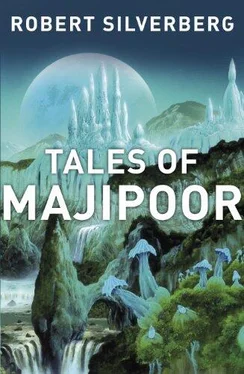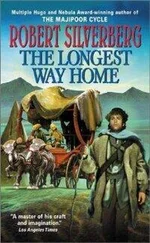Robert Silverberg - The Way They Wove the Spells in Sippulgar
Здесь есть возможность читать онлайн «Robert Silverberg - The Way They Wove the Spells in Sippulgar» весь текст электронной книги совершенно бесплатно (целиком полную версию без сокращений). В некоторых случаях можно слушать аудио, скачать через торрент в формате fb2 и присутствует краткое содержание. Год выпуска: 2013, ISBN: 2013, Издательство: Gollancz, Жанр: Фэнтези, на английском языке. Описание произведения, (предисловие) а так же отзывы посетителей доступны на портале библиотеки ЛибКат.
- Название:The Way They Wove the Spells in Sippulgar
- Автор:
- Издательство:Gollancz
- Жанр:
- Год:2013
- ISBN:978-0-575-13006-7
- Рейтинг книги:5 / 5. Голосов: 1
-
Избранное:Добавить в избранное
- Отзывы:
-
Ваша оценка:
- 100
- 1
- 2
- 3
- 4
- 5
The Way They Wove the Spells in Sippulgar: краткое содержание, описание и аннотация
Предлагаем к чтению аннотацию, описание, краткое содержание или предисловие (зависит от того, что написал сам автор книги «The Way They Wove the Spells in Sippulgar»). Если вы не нашли необходимую информацию о книге — напишите в комментариях, мы постараемся отыскать её.
The Way They Wove the Spells in Sippulgar — читать онлайн бесплатно полную книгу (весь текст) целиком
Ниже представлен текст книги, разбитый по страницам. Система сохранения места последней прочитанной страницы, позволяет с удобством читать онлайн бесплатно книгу «The Way They Wove the Spells in Sippulgar», без необходимости каждый раз заново искать на чём Вы остановились. Поставьте закладку, и сможете в любой момент перейти на страницу, на которой закончили чтение.
Интервал:
Закладка:
Everyone always calls it golden Sippulgar. Now I saw why. Its buildings, which are no more than two and three stories high, are made from a golden sandstone, flecked with bits of mica, that gleams with a dazzling brightness when the sun comes up out of the southern sea. I was amazed by the intensity of that brightness, and by the lushness of the decorative plantings that lined the streets: a hundred different kinds of tropical shrubs, all of them unknown to me, whose blossoms blazed forth in orange and green and scarlet and blue and gold, with darker ones in maroon and even jet-black interspersed among them for contrast. They exuded such a wealth of fragrance that the air itself seemed perfumed. Small wonder this district is known as the Incense Coast. I could not tell one plant from another, but I knew from a lifetime spent among bills of lading and customs forms that the region around Sippulgar was rich in cinnamon and khazil, the balsam called hinnam, thanibong trees and scarlet fhiiis, and many another scented plant, from which were produced a host of aromatic oils and gums.
I had booked a room in a hotel close to the city center, so that it would be easy for me to consult the official documents and records I needed in my quest. It was situated just a couple of blocks from the waterfront; and on my way there it was my bad luck to become entangled in a religious procession, of a sort that I soon learned was ubiquitous here. And so I stood for an hour and a half waiting amidst my baggage before I was able to cross the street and continue on to my lodgings.
Even in this era of multitudinous cults and sorceries, Sippulgar stands out for its abundance of strange creeds. Perhaps it is the heavy tropical air that spawns such credulity. At home in Sisivondal only one of these superstitions holds sway, the cult of the Beholders. All too frequently I have seen its worshippers dancing ecstatically down Grand Alaisor Avenue, strewing costly imported fiower-petals everywhere and blowing on pipes and flutes as the grotesque statuettes that are their seven sacred artifacts are carried on high, preceding the great box that they call the Ark of the Mysteries and the ebony cart that carries their high priest, who wears a mask with the visage of a terrifying yellow-eyed hound. What it is that the Beholders seek, and what they find, I will never know; but at least we have only that one cult to interrupt the smooth flow of commerce with its antics. In Sippulgar, I soon would learn, there were dozens.
From a distance I heard the shrill shriek of bellhorns, the crashing of cymbals, the tremendous uproar of a platoon of kettle-drums. When I drew nearer I saw my route blocked by a horde of marchers wearing nothing but loincloths and sandals, striding along with their heads upraised to the sky. There seemed to be millions of them. The people of Sippulgar are dark-skinned, mostly, no doubt some adaptation to the intense sunlight, but the sweat-shiny bodies of the marchers were streaked with bright splotches of red and green and purple that echoed the gaudiness of the shrubs in bloom all about them. There was no hope of crossing the street. I stood and waited. Eventually a group of weeping, chanting worshippers came down the boulevard pulling a massive platform on which stood the wooden image of a winged serpent that had the frightening toothy-snouted blazing-eyed face of a jakkabole, that ravenous, angry beast of the eastern highlands. I turned to the man who stood beside me. “I am a stranger here,” I said. “What god is that they worship?”
“It is Time,” he told me. “The devourer of all.”
Yes. The winged serpent that flies ever onward, jaws agape, engulfing everything in its path, as even the maddened jakka-boles do when they descend on the farms of the Vrambikat Valley in their ravening hunger. I watched the good folk of Sippulgar, lost in their madness, march on and on and on until at last the boulevard was clear, and I went across to my hotel and sank down gratefully on the softest of beds.
What I knew about my brother-in-law Melifont’s life, and of his supposed fate, was this:
He was one of those unhappy men fated to fail at every enterprise he turned his hand to, despite the advantages of intelligence, zeal, and energy. At an early age he had left Sisivondal for the southlands to seek his fortune. He involved himself first in a mining project in the lava country back of the port of Glystrintal, where since time immemorial bold fools had sought for rumored mines of silver and gold. Melifont found neither silver nor gold, and when he moved on to search for the equally fabulous iron mines of Skakkenoir of the red soil, he returned so damaged from his adventures that his recovery took over a year. Hoping then for a quieter life, he settled next on the Stoienzar Peninsula, where he worked for a time as a tavernkeeper but appears also to have helped to found a bank that prospered greatly for a time, though ultimately it came to grief in a spectacular way. It was during his period of prosperity that I married his younger sister, and he returned to Sisivondal for the first time in many years to attend the ceremony. He was then about forty, a tall, handsome man with a florid face and sleek black hair, who limped a little, a souvenir of his mining project in Skakkenoir. I found him charming—magnetic, even—and Thuwayne, who had not seen her swaggering brother since she was a little girl, looked at him constantly in wonder and fascination. He presented us with a wedding gift of surprising generosity, which I put to good use in the expansion of my warehousing business.
Next we heard of him, his bank had failed—the malfeasance of a conniving partner, we were told—and he was off to Zimroel to sell rope to the Shapeshifters, or some such thing. Very little news travels from remotest Zimroel to our part of the world, and I have no idea how Melifont occupied himself for the decade that followed; but then he turned up in Sisivondal once again, looking very much older, his hair now gray and sparse, his limp more pronounced, but he was still charismatic, still full of ambition and optimism. His new endeavor was a shipping company that proposed to run a ferry service across the Inner Sea between Piliplok in Zimroel and the port of Tolaghai in our sun-blasted southern continent of Suvrael. I thought it was a crazy idea myself—Suvrael is a terrible place, and produces almost nothing useful—but in my relief at not being asked to finance his company out of my own pocket I gladly introduced him to several bankers of my acquaintance, whom he charmed into putting up a huge sum to underwrite his shipping operation. That was the last I saw of my brother-in-law Melifont. Now and again I asked my friends in shipping circles what they had heard of his ferry company, and in time I learned that it, too, had gone bankrupt. We heard from him only once more: a letter, three years back, that let us know that he had settled now in Sippulgar and had some interesting ideas for capitalizing on business conditions there. After that, only silence, until the puzzling next-of-kin letter from the Prefecture of Sippulgar inviting my sister to collect her brother’s effects.
The letter did not actually say he was dead. He was simply “no longer in Sippulgar,” she was told, and there was unclaimed property which would revert to the province if not collected by a member of his family. Certainly the implication of death was there, but not the certainty. I made inquiries in official circles and learned, after much patient probing, that Melifont Ambithorn had vanished under mysterious circumstances, was not expected to return, and his property in Sippulgar, such as it might be—undescribed—was formally considered to have been abandoned by him. Further inquiry yielded me nothing. “Mysterious circumstances,” was all anyone would say, and though I used my best political and commercial connections to get some more detailed explanation, the mystery remained a mystery. He had disappeared, and so far as the Prefecture of Sippulgar was concerned there was no likelihood of his turning up again, but no one would say explicitly that he was dead. Thuwayne could not accept such vagueness. Thus my journey to Sippulgar.
Читать дальшеИнтервал:
Закладка:
Похожие книги на «The Way They Wove the Spells in Sippulgar»
Представляем Вашему вниманию похожие книги на «The Way They Wove the Spells in Sippulgar» списком для выбора. Мы отобрали схожую по названию и смыслу литературу в надежде предоставить читателям больше вариантов отыскать новые, интересные, ещё непрочитанные произведения.
Обсуждение, отзывы о книге «The Way They Wove the Spells in Sippulgar» и просто собственные мнения читателей. Оставьте ваши комментарии, напишите, что Вы думаете о произведении, его смысле или главных героях. Укажите что конкретно понравилось, а что нет, и почему Вы так считаете.












